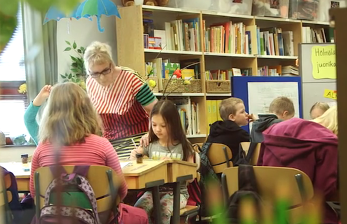Europa/Finlandia/ncee.org
Resumen: Desde el inicio del Programa de Evaluación Internacional de Estudiantes (PISA) en 2000, Finlandia ha atraído la atención internacional y el reconocimiento por su liderazgo sostenido como un sistema educativo de alto rendimiento. Como se destacó en la iniciativa de Linda Darling-Hammond, NCEE apoyó el estudio de Empowered Educators , uno de los principales impulsores del éxito de Finlandia radica en su preparación para profesores basada en la investigación, basada en la investigación clínica. El equipo de investigación de Empowered Educators identificó un compromiso con la profesionalización de la enseñanza como ocupación como elemento esencial de los sistemas que producen maestros y enseñanza de alta calidad. La clave de esta profesionalización es la formación inicial y la inducción de los profesores.
Si bien Finlandia es uno de los pocos países que requiere que todos los profesores obtengan un título de maestría en licenciatura, no es sólo la duración del estudio, sino también el rigor intelectual y la preparación clínica es lo que hace de Finlandia un líder mundial en Educación. Finlandia ha restringido los programas de preparación de maestros K-12 a sólo ocho universidades de investigación. La entrada a estos programas es altamente competitiva, consistente en un examen de ingreso de tres horas, el VAKAVA, que evalúa la inferencia y las capacidades analíticas de los solicitantes, seguido de una entrevista diseñada para evaluar a los candidatos sobre una base holística que evalúa su interés y la capacidad de enseñanza. Mientras que el proceso de la entrevista varía según cada universidad, los profesores que administran las entrevistas evalúan en el candidato(a), su motivación,
Una vez aceptado en la formación inicial del profesorado, el programa combinado de pregrado y maestría de 5 años consta de profundas actividades de inmersion en materia educativa, el estudio simultáneo de la pedagogía y la teoría y el estudio de métodos de investigación – competencias consideradas centrales para el desarrollo docente. Además, la preparación finlandesa de maestros incluye requisitos clínicos sustanciales con oportunidades ampliadas de aprender de maestros expertos que demuestran práctica basada en la investigación en «escuelas de capacitación de maestros» asociadas con el programa de educación de maestros de la universidad.
El siguiente video, «Aprender a enseñar en la práctica: las escuelas de formación de profesores de Finlandia», destaca uno de estos escenarios clínicos en la Escuela de Formación de Maestros Viiki afiliada a la Universidad de Helsinki. El video fue financiado por NCEE y la Fundación Ford y es uno de los muchos recursos producidos por el estudio Empowered Educators . Además de varias herramientas, documentos originales y entrevistas con políticos y profesionales, este video se puede encontrar en la biblioteca de recursos en línea de Educadores Empowered , junto con una serie de libros electrónicos y breves informes sobre cada una de las siete jurisdicciones estudiadas, Y memorias de política sobre temas críticos relacionados con el reclutamiento, desarrollo y apoyo de maestros de alta calidad.
Since the inception of the Programme for International Student Assessment (PISA) in 2000, Finland has attracted international attention and recognition for its sustained leadership as a high-performing education system. As highlighted in the Linda Darling-Hammond led, NCEE supported Empowered Educators study, a major driver of Finland’s success lies in its clinically robust, research-based teacher preparation. The Empowered Educators research team identified a commitment to professionalizing teaching as an occupation as an essential element of systems that produce high-quality teachers and teaching. Key to this professionalization is strong initial teacher education and induction.
While Finland is one of the few countries that requires all teachers to obtain a master’s degree for licensure, it is not the just the length of study, but also the intellectual rigor and clinical preparation that make Finland a world leader in teacher pre-service and preparation. With no alternative routes into teaching, Finland has restricted K-12 teacher preparation programs to just eight research universities. Entrance into these programs is highly competitive consisting of both a three-hour entrance exam, the VAKAVA, that tests applicants’ inference and analytical abilities followed by an interview designed to assess candidates on a holistic basis and evaluate their interest in and capacity for teaching. While the interview process varies by university, teacher educators who administer the interviews look at the motivation, willingness to work collaboratively, and passion for teaching in prospective candidates, ensuring the selection of high-quality teachers who are able to meet not just the academic demands of the profession, but also exhibit a deep commitment to the work.
Once accepted into initial teacher education, the 5-year combined undergraduate and master’s program consists of deep dives into subject matter, simultaneous study of pedagogy and theory, and the study of research methods – competencies considered central to teacher development. In addition, Finnish teacher preparation includes substantial clinical requirements with extended opportunities to learn from expert teachers demonstrating research-based practice at “teacher training schools” associated with the university’s teacher education program.
The video below, ‘Learning to Teach in Practice: Finland’s Teacher Training Schools’, highlights one such clinical setting at The Viiki Teacher Training School affiliated with the University of Helsinki. The video was funded by NCEE and the Ford Foundation and is one of many resources produced by the Empowered Educators study. In addition to various tools, original documents, and interviews with policymakers and practitioners, this video can be found on the Empowered Educators online resource library along with a series of e-books and country briefs covering each of the seven jurisdictions studied, including Finland, and policy briefs on critical topics relating to the recruitment, development and support of high-quality teachers.






 Users Today : 152
Users Today : 152 Total Users : 35459747
Total Users : 35459747 Views Today : 273
Views Today : 273 Total views : 3418245
Total views : 3418245